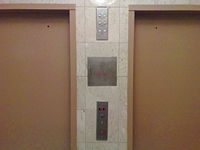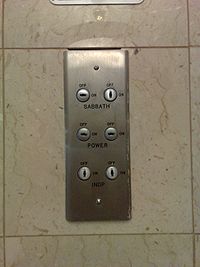
Sabbath elevator
Encyclopedia


Elevator
An elevator is a type of vertical transport equipment that efficiently moves people or goods between floors of a building, vessel or other structures...
which works in a special mode, operating automatically, a way to circumvent the Jewish law
Halakha
Halakha — also transliterated Halocho , or Halacha — is the collective body of Jewish law, including biblical law and later talmudic and rabbinic law, as well as customs and traditions.Judaism classically draws no distinction in its laws between religious and ostensibly non-religious life; Jewish...
requiring observers to abstain from operating electric switches on Shabbat
Shabbat
Shabbat is the seventh day of the Jewish week and a day of rest in Judaism. Shabbat is observed from a few minutes before sunset on Friday evening until a few minutes after when one would expect to be able to see three stars in the sky on Saturday night. The exact times, therefore, differ from...
. An elevator may be marked with a sign noting that it is specially configured for Shabbat observance. There are several ways the elevator works (going up and down); stopping at every floor, stopping at alternative floors, or rising to the top floor and stopping while going down.
Shabbat elevators can be found in areas of large Jewish population in Israel
Israel
The State of Israel is a parliamentary republic located in the Middle East, along the eastern shore of the Mediterranean Sea...
, the United States
United States
The United States of America is a federal constitutional republic comprising fifty states and a federal district...
and Argentina
Argentina
Argentina , officially the Argentine Republic , is the second largest country in South America by land area, after Brazil. It is constituted as a federation of 23 provinces and an autonomous city, Buenos Aires...
. They are typically found in big hotels, Israeli hospitals and other health institutions, apartment buildings, and in some synagogues.
The Israeli Knesset
Knesset
The Knesset is the unicameral legislature of Israel, located in Givat Ram, Jerusalem.-Role in Israeli Government :The legislative branch of the Israeli government, the Knesset passes all laws, elects the President and Prime Minister , approves the cabinet, and supervises the work of the government...
passed a special Shabbat elevator law in 2001 ordering the planning and building of all residential buildings, and public buildings which have more than one elevator, to install a control mechanism for Shabbat (Shabbat module
Shabbat module
The Shabbat module is a technology solution for Orthodox Jews who need to use an electronic appliance on Shabbat. The module usually overrides the usual, everyday operation of the electrical appliance and makes the operation of the appliance comply with the halachic rules of the Torah...
) in one of the elevators.
In this mode, an elevator will stop automatically at every floor, allowing people to step in and out without having to press any buttons. Otherwise it is prohibited to use an elevator on Shabbat because pressing the button to operate the elevator closes a circuit, which violates the prohibition of building on Shabbat, and may also indirectly lead to "writing" of the new floor number in the display.
In 2009 senior haredi rabbis, led by Rabbi Yosef Shalom Elyashiv, published a religious injunction forbidding the use of Shabbat elevators.
A non-Jew known as a Shabbos goy may be employed to press the buttons and hold the door for Jewish people, in buildings that do not have Shabbat elevators. As discussed in that article, a non-Jew is not expected to keep the Sabbath like a Jew. Hence a Jew may benefit from work performed by a goy if the goy performs this work for his own good and of his own free will. A borderline case is when a Jew hints to a non-Jew that he wants him to perform a certain service without explicitly asking him. These borderline cases are considered legitimate in most Jewish communities.
Criticism
There are three categories of criticism against using a Shabbat elevator. First, even in Shabbat mode the user is indirectly violating Shabbat. Second, even if it is altogether permitted, a healthy person should not resort to circumventing the laws of Shabbat by performing an otherwise prohibited activity in a technically permissible manner. Finally, they are inefficient due to their continuous energy usage.Elevators may be prohibited anyway
Some halakhic authorities rule that this classic Shabbat elevator does not fully overcome the relevant halakhic issues. Among other things, a person's weight on a downward-traveling elevator can be considered to partly cause the elevator’s descent, and therefore the activation of all electric circuits which come into play as a result of it. Thus, when a person ascends in an elevator, the motor that moves the counterweight down and the elevator car up is operating to counteract the rider's weight, which is a hindrance to make operation of the elevator require more work-energy. However, when a person descends an elevator, the person's weight helps move the elevator in the downward direction, so the person is considered physically to cause the elevator to move down. Accordingly, some authorities permit ascending in an elevator but prohibit descending.The movement of an elevator may also indirectly cause other forbidden actions to take place. For example, in many systems, one light turns off and another light turns on as the elevator passes from one floor to the next. Turning on incandescent floor lights represents a Biblical prohibition against kindling a fire on the Sabbath. The Zomet Institute
Zomet Institute
The Zomet Institute is an Israeli high-tech non-profit organization specializing in IT equipment and electronic appliances designed to meet Halakha.-The company:...
and the Institute for Science and Halacha modify elevators to avoid these problematic issues.
Elevators are permitted but should not be used
The use of an elevator in a Shabbat mode, is an example of a legal workaround, where seemingly "forbidden" acts can be performed by modifying the relevant technology to such an extent that no law is actually violated. Usage of a Shabbat elevator by those who are otherwise capable is considered by some rabbinical authorities as a "violation" of Shabbat, therefore many Orthodox Jews might prefer to walk up or down the stairs instead of taking an elevator.Energy waste from continuous operation
In comparison to a normal elevator which remains stationary until needed, Shabbat mode has the side effect of wasting considerable amounts of energy, needlessly running the elevator car sequentially up and down every floor of a building, repeatedly servicing floors where it is not needed. For a tall building with many floors, the car must move on a frequent enough basis so as to not cause undue delay for potential users that will not touch the controls as it opens the doors on every floor up the building.See also
- 39 categories of activity prohibited on Shabbat
- Electricity on ShabbatElectricity on ShabbatMany Jews who observe Shabbat , especially within Orthodox Judaism, have the practice of refraining from turning electricity on or off during Shabbat. In most cases they also abstain from making adjustments to the intensity of an electrical appliance as well.Authorities of Jewish law have disagreed...
- Driving on ShabbatDriving on ShabbatAccording to Jewish law, the operation of a motor vehicle constitutes multiple violations of the prohibited activities on Shabbat. Though Jewish law is based on texts that existed long before the existence of the automobile, various writings prohibit during Shabbat the actions that take place as a...

